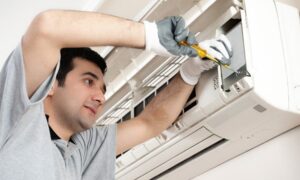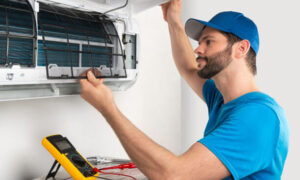Introduction:
Your air conditioning (AC) unit is a vital component of your home’s comfort, especially during hot summer months. However, like any other mechanical system, AC units can encounter issues requiring repair. When faced with a malfunctioning AC, understanding the potential costs involved is crucial. In this article, we’ll delve into the factors that influence AC repair costs, provide estimates, and offer tips on how to manage expenses efficiently.
Factors Affecting AC Repair Costs:
Type of Repair:
- The cost of repairing an AC unit can vary significantly depending on the type of repair needed. Common issues include refrigerant leaks, compressor failures, capacitor problems, thermostat malfunctions, and fan motor issues. Complex repairs, such as replacing the compressor or evaporator coil, tend to be more expensive than simpler fixes like replacing a capacitor.
Age and Condition of the Unit:
- Older AC units may require more frequent repairs due to wear and tear. Additionally, sourcing replacement parts for outdated models can be more challenging and expensive. If your AC unit is nearing the end of its lifespan, you might want to consider the cost-effectiveness of repairs versus investing in a new unit.
Warranty Coverage:
- If your AC unit is still under warranty, certain repairs may be covered, reducing your out-of-pocket expenses. However, warranty coverage varies depending on the manufacturer and the specific terms outlined in the warranty agreement. Be sure to check the warranty details before proceeding with any repairs.
Accessibility:
- The accessibility of the AC unit can also impact repair costs. Units located in hard-to-reach areas or requiring specialized equipment for access may incur higher labor charges. Additionally, if extensive disassembly is necessary to reach the components needing repair, the overall cost may increase.
Contractor Rates:
- HVAC contractors typically charge for their services based on factors such as their level of experience, geographic location, and overhead costs. It’s essential to obtain multiple quotes from reputable contractors to compare prices and ensure you’re getting a fair deal.
Estimated Costs of Common AC Repairs:
Refrigerant Leak Repair:
- Repairing a refrigerant leak can cost anywhere from $200 to $1,500, depending on the location and severity of the leak. Keep in mind that simply refilling refrigerant without addressing the underlying leak is not a long-term solution and can lead to further damage.
Compressor Replacement:
- Replacing a compressor is one of the costliest AC repairs, with prices ranging from $1,500 to $2,500 or more. The compressor serves as the heart of the AC system, responsible for circulating refrigerant and maintaining optimal cooling capacity.
Capacitor Replacement:
- Capacitor replacement is a relatively inexpensive repair, typically costing between $100 and $400. Capacitors are essential for starting the compressor and fan motors, and a faulty capacitor can cause the AC unit to fail to start or experience intermittent operation.
Evaporator Coil Replacement:
- Replacing an evaporator coil can be a significant expense, ranging from $600 to $2,000 or more. The evaporator coil is responsible for absorbing heat from the indoor air, and a leak or malfunction can result in reduced cooling efficiency.
Thermostat Replacement:
- The cost of replacing a thermostat typically falls between $100 and $300. A malfunctioning thermostat can lead to temperature inconsistencies and inefficient operation of the AC system.
Tips for Managing AC Repair Costs:
Regular Maintenance:
- Schedule annual maintenance inspections for your AC unit to identify and address potential issues before they escalate into costly repairs. Routine maintenance can also help optimize the efficiency and lifespan of your AC system.
DIY vs. Professional Repairs:
- While some minor repairs can be tackled as DIY projects by homeowners with the necessary skills and knowledge, it’s essential to know your limitations. Attempting complex repairs without proper training can result in further damage and higher repair costs in the long run.
Consider Energy Efficiency:
- If your AC unit is outdated and prone to frequent breakdowns, investing in a newer, more energy-efficient model may be a cost-effective solution in the long term. Energy-efficient units can lower your utility bills and require fewer repairs over time.
Get Multiple Quotes:
- Don’t hesitate to shop around and obtain quotes from multiple HVAC contractors before committing to a repair. Be wary of unusually low estimates, as they may indicate subpar workmanship or the use of inferior quality parts.
Conclusion:
AC repairs are an inevitable part of homeownership, but by understanding the factors influencing repair costs, obtaining multiple quotes, and prioritizing regular maintenance, you can effectively manage expenses and ensure your AC unit operates smoothly for years to come. Remember, investing in timely repairs and maintenance can ultimately save you money in the long term while keeping your home comfortable year-round.



































